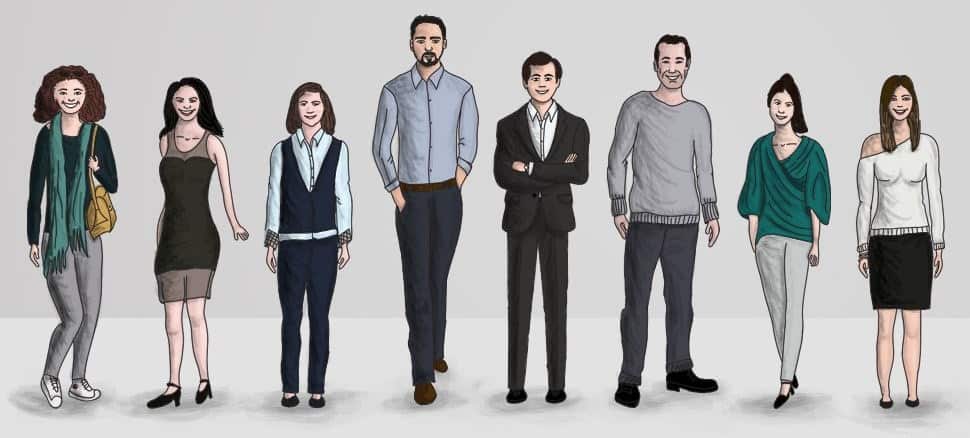Meet Kerem Siral, the founder of Minimal Group, a start-up that is currently active in the e-commerce sector. We spoke about his company’s projects, Aradolu and Terzii, the start-up culture in Turkey and how he views Istanbul after his time abroad in the United States. Check out our profile of Aradolu, a site that we here at Yabangee think is pretty excellent, to learn more about its impressive offering of organic and natural food products and crafts.

Kerem, can you tell us a little bit about yourself?
Well I’m an Istanbul native, I lived here for around 19 years. At the age of 19 I went to the United States for my college education. I went to Macalaster, a small liberal arts school where I studied political science, sociology and economics.
That’s a big range of topics.
I really wanted to see the whole system from different perspectives, from political science and sociology to economics, and studying so many subjects allowed me to do that. Now I can paint the whole picture – I can say that I definitely understand the system much better.
Do you feel like studying so many different things has helped you in your career so far?
Definitely, I think for entrepreneurship a liberal arts education is the best thing that one can ever get because you are not too specialized. And when you are starting something from zero you need to know each aspect of it, so a liberal arts degree worked well for me.
So you’re an entrepreneur, can you tell us about your business?
The business first came out of the Terzii idea. When I was in the United States, I saw that e-commerce is being done really well. But I noticed that while the process is done well, once you’ve purchased the commodity, like on Amazon and Craigslist, that’s the end of the transaction. Plus, overall, the interface is really simple. So my idea was to bring the Amazon functionality together with the Turkish or, let’s say, European aesthetic and really make a difference in the industry worldwide. The Terzii idea came from there – I basically wanted to create something that will be interactive and that appeals to the younger generations – our generation and the one right after us. I want e-commerce to become an experience, not something where you just pay for a product and get it. Basically, I wanted to make it an interactive experience.
The Terzii idea came first, you have Aradolu as well and then there’s the Minimal Group – can you walk me through the development of all those projects?
There are two projects (Terzii and Aradolu) but Minimal is the company. It’s like – I mean this is a long way off – but it’s like how Apple has the Macbook Air and iPhone. So right now we have the general company, but the projects are completely different. At the moment we are trying to find synergy within the e-commerce industry, but we consider ourselves to be a technology company. So as Minimal we will be looking forward to digital applications too, and quite soon actually.
Can you tell us a little about Aradolu, how did you come up with that idea?
Well, first, Terzii is a very innovative software and our software team told us it will take one year to build it, so in the meantime we wanted to do something different. While we were traveling all over Anatolia, we were really impressed with the region and its many precious artisans, craftsmen and farmers. So we wanted to bring them to one platform and first introduce them to Turkish people, because we don’t know the value of it, honestly, and then introduce it to areas outside of Turkey, with the goal of eventually having a worldwide reach. Basically, we want to make a brand out of Anatolia, because we have great products here but we don’t know how to make brands. That’s what I learned in the United States, how to make brands.
How do you find these craftsmen and the farmers making the organic food products? How do you go about building relationships with these people?
For three months I traveled all around the country with the sales team and I met with the owner of each place. I tried their products and some of them we couldn’t get deals with because they put glucose syrup or something like that – you know we have strict ideals. I personally met with them, was their guest, stayed at their place and traveled all around Anatolia, so I know that I can trust these guys and I know that they are telling us the truth. We got their organic certificates, too, so that we can make sure our customers are getting the best out of Anatolia. For hand-crafted products you know there are a lot of specialized hand-crafted products in Istanbul, in Galata, but they are ‘find-me’ locations. So we search for them, talk to them and say hey this is a great project, would you like to work with us and most of them were happy to work with us. They told me, hey Kerem, we trust you and we trust your company, so we’d like to work with you.
As you grow do you think the business model might change?
The principle I follow is to be the voice of the small supplier. There are so many conglomerates, so many big businesses here in Turkey, and in turn these small suppliers go out of business and these traditional and beautiful arts and crafts do not continue. The whole mission of Aradolu is to protect these gems by getting them more exposure.
What’s it like creating a start-up in Turkey? Has it been different than you expected it to be? Has it been a lot of headaches or relatively easy?
It is actually so much harder. The United States has a great investment infrastructure, if you have an idea you can go out and you can find one of the 20,000 angel investors. In Turkey there are five or six I think – that’s a huge difference. Plus, you know, there is a big difference between venture capitalists and angel investors – angel investors are the ones who finance you but they don’t grab the whole thing if you become a big success, that’s the reason why they are called angel investors. So while there are venture capitalists coming here from Europe, it’s still very low in terms of numbers and, again, there are even fewer angel investors. So for entrepreneurs it’s hard – first you need to find an investor and you need to convince them to invest in you. But once you get through that part things become easier. For instance it takes six days to build a company on paper and you have a lot of partners that will be able to help you, like banks – they are incredible in Turkey. There are many other smaller pieces as well, we have a good cargo system with a lot of competition and low prices. So really, you have every tool you need except you don’t have the investment infrastructure.
Changing gears a bit, how was it coming back to Istanbul after living abroad? Do you feel like you see the city differently now?
Definitely, I’ve learned so much about the city. When I was living here as a kid, I didn’t know much, I only knew the places where my friends hung out. But when I came back after living in the United States for five years, it was a totally different experience and that was when I really fell in love with Istanbul. When I came back there was this huge city to explore and a completely different world. I mean, when you think about Manhattan or New York there are different neighborhoods and each one has its own feeling, it’s almost like the air changes. Well in New York it takes 10 or 20 minutes before you reach a new neighborhood, before the air changes. But in Istanbul the neighborhood changes as you’re walking – it is totally different and an intense experience. Take Galata for instance, the air changes so quickly – one street is the design street and the next street is a craftsmen street and the next is the bank street, it goes on and on. This is something I’ve really appreciated after my time as an expat in the United States.
Is there anything else you want to say to the Yabangee readers?
I know it can be hard finding jobs as a foreigner here (outside of teaching English) so what I want to say is hang in there, you’ll find the right opportunity. It’s a great city, even though it can be hard to live here at times, and I’m always willing to sit down and talk to any foreigners trying to make it work in Istanbul.









